In our personal and professional lives, there are moments when we find ourselves needing to address difficult situations with others.
Whether it’s expressing disagreement, setting boundaries, or dealing with unwanted attention, the way we communicate can greatly impact the outcome.
However, maintaining professionalism and respect is key, even in moments of frustration.
In this blog post, we will explore How to tell someone off in a professional way and polite manner.
From handling confrontations at work to addressing uncomfortable interactions through email, we’ll provide practical insights and strategies to help you navigate these challenging scenarios with grace and assertiveness.
Let’s dive in and discover the power of professional communication in handling sensitive situations.
Table of Contents
How to tell someone off in a professional way?
When faced with a situation where you feel the urge to tell someone to “go to hell”, “F off”, “Go away”, “Leave me alone” or use any similar derogatory phrase, it’s essential to remember the importance of maintaining professionalism and respectful communication.
While such phrases may offer temporary relief, they are detrimental to building positive relationships and fostering a healthy work environment.
Instead of resorting to offensive language, consider alternative approaches to address the issue professionally and constructively.
One effective method is to focus on clarifying roles and responsibilities.
Acknowledge the expertise and value that each person brings to the team while emphasizing the significance of clear communication and collaboration.
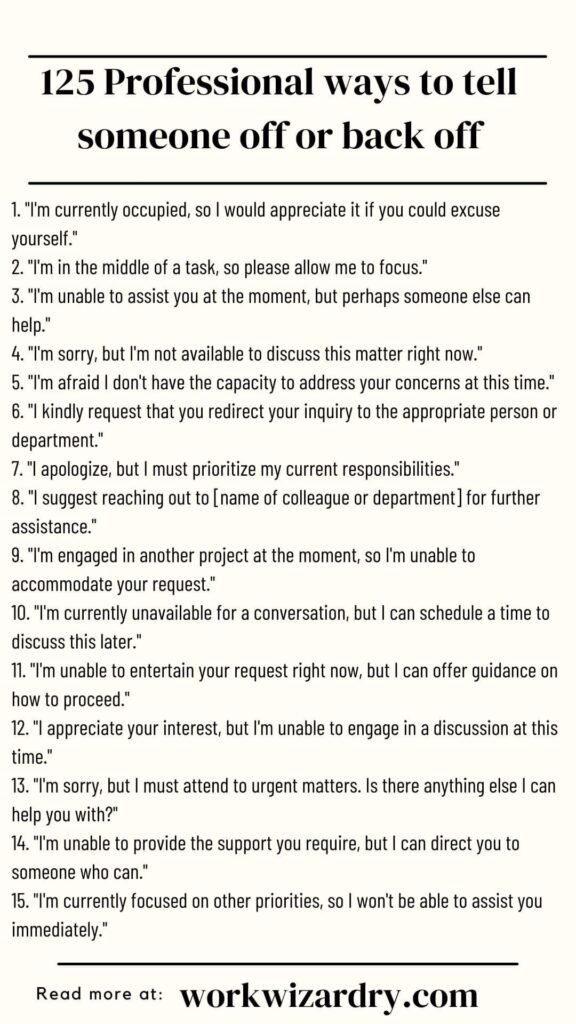
How to professionally tell someone off ?
The following is a list of 125 professional ways to tell someone off at workplace or any professional conversations:
1. “I think we had better keep farther apart.”
2. “I think it’s best if we keep our professional relationship strictly business.”
3. “I need you to respect my boundaries and stop crossing them.”
4. “I’m sorry, but this is not appropriate for the workplace. Please keep your comments and actions professional and respectful.”
5. “I’m not comfortable with the way you’re approaching me. Please respect my boundaries.”
6. “I think it’s best if we stick to our own responsibilities for now.”
7. “Thank you for your concern, but I have this under control and would prefer to handle it on my own.”
8. “I understand you’re trying to be helpful, but I would prefer to handle this independently.”
9. “I’m sorry, but I don’t feel comfortable with this conversation. Please respect my wishes and let’s move on.”
10. “Kindly respect my boundaries and keep our interactions strictly professional.”
11. “I don’t appreciate your behavior towards me. Please stop.”
12. “I think it’s important for us to maintain a professional distance and stay focused on our own work.”
13. “I would appreciate it if you could maintain a professional distance when we’re working together.”
14. “I think it’s important to maintain a professional boundary in our interactions.”
15. “I think it’s important for us to respect each other’s boundaries and work independently for now.”
Also read: How to professionally say go to hell? (75+ Examples and tips)
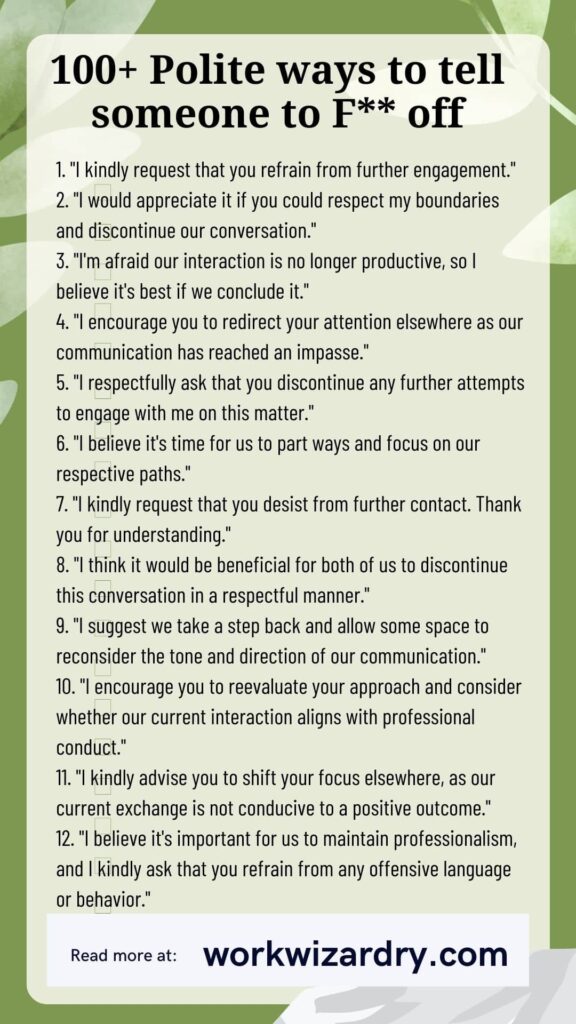
How to politely tell someone to f off ?
These are some professional and polite ways to tell someone f*ck off:
1. “I kindly request that you refrain from further engagement.”
2. “I would appreciate it if you could respect my boundaries and discontinue our conversation.”
3. “I’m afraid our interaction is no longer productive, so I believe it’s best if we conclude it.”
4. “I encourage you to redirect your attention elsewhere as our communication has reached an impasse.”
5. “I respectfully ask that you discontinue any further attempts to engage with me on this matter.”
6. “I believe it’s time for us to part ways and focus on our respective paths.”
7. “I kindly request that you desist from further contact. Thank you for understanding.”
8. “I think it would be beneficial for both of us to discontinue this conversation in a respectful manner.”
9. “I suggest we take a step back and allow some space to reconsider the tone and direction of our communication.”
10. “I encourage you to reevaluate your approach and consider whether our current interaction aligns with professional conduct.”
11. “I kindly advise you to shift your focus elsewhere, as our current exchange is not conducive to a positive outcome.”
12. “I believe it’s important for us to maintain professionalism, and I kindly ask that you refrain from any offensive language or behavior.”
13. “I think it would be in our best interest to disengage and find more constructive avenues of communication.”
14. “I encourage you to reflect on the impact of our conversation and consider whether it aligns with mutual respect and professionalism.”
15. “I kindly request that you refrain from any further attempts to engage in a confrontational manner.”
16. “I believe it’s essential for us to find common ground and maintain a respectful tone in our communication.”
17. “I encourage you to consider the impact of your words and actions on the overall dynamics of our interaction.”
18. “I kindly ask that you redirect your energy towards more positive and productive endeavors.”
19. “I believe it’s time for us to respectfully disengage and focus on fostering a healthier communication environment.”
20. “I encourage you to adopt a more constructive and respectful approach to our conversation. Let’s find common ground or agree to move on.”
Also read: What to say instead of no problem? 100 synonyms and example phrases to use
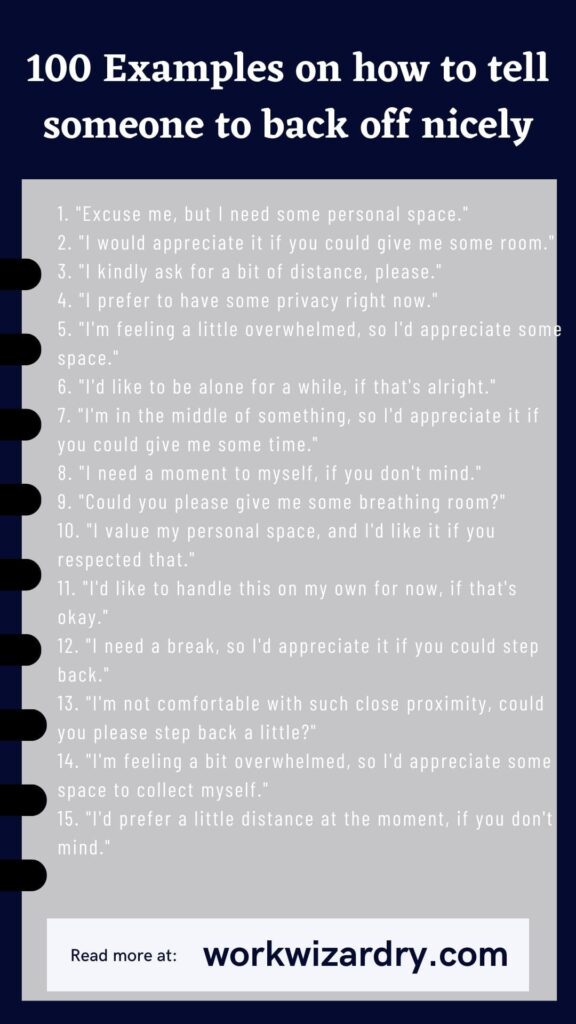
How to tell someone to back off nicely?
Here is a list of examples on How to professionally say back off in a nice and respectful way:
1. “Excuse me, but I need some personal space.”
2. “I would appreciate it if you could give me some room.”
3. “I kindly ask for a bit of distance, please.”
4. “I prefer to have some privacy right now.”
5. “I’m feeling a little overwhelmed, so I’d appreciate some space.”
6. “I’d like to be alone for a while, if that’s alright.”
7. “I’m in the middle of something, so I’d appreciate it if you could give me some time.”
8. “I need a moment to myself, if you don’t mind.”
9. “Could you please give me some breathing room?”
10. “I value my personal space, and I’d like it if you respected that.”
11. “I’d like to handle this on my own for now, if that’s okay.”
12. “I need a break, so I’d appreciate it if you could step back.”
13. “I’m not comfortable with such close proximity, could you please step back a little?”
14. “I’m feeling a bit overwhelmed, so I’d appreciate some space to collect myself.”
15. “I’d prefer a little distance at the moment, if you don’t mind.”
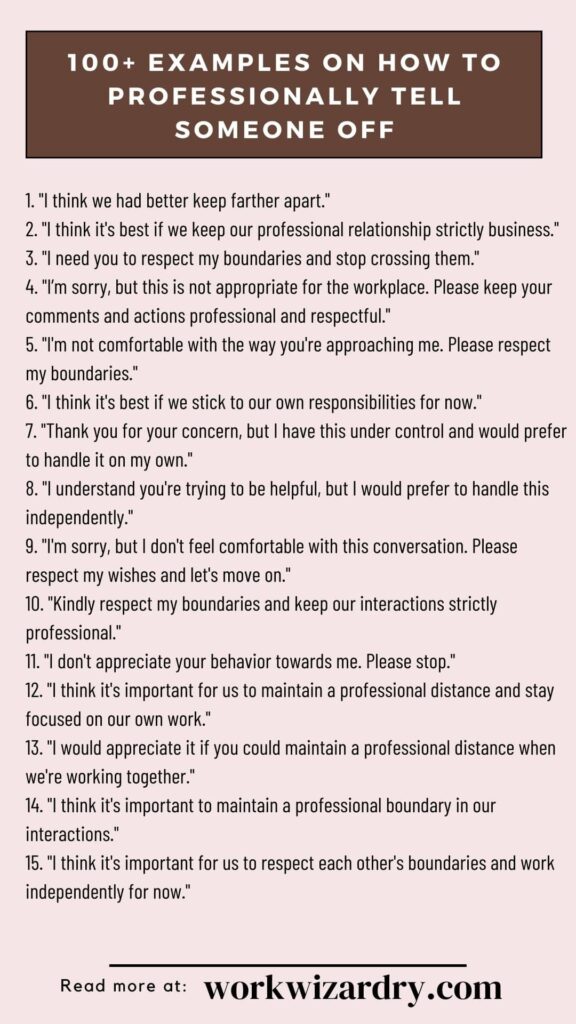
How to professionally say go away?
These are some how to tell someone off professionally and some ways to say go away politely:
1. “I’m currently occupied, so I would appreciate it if you could excuse yourself.”
2. “I’m in the middle of a task, so please allow me to focus.”
3. “I’m unable to assist you at the moment, but perhaps someone else can help.”
4. “I’m sorry, but I’m not available to discuss this matter right now.”
5. “I’m afraid I don’t have the capacity to address your concerns at this time.”
6. “I kindly request that you redirect your inquiry to the appropriate person or department.”
7. “I apologize, but I must prioritize my current responsibilities.”
8. “I suggest reaching out to [name of colleague or department] for further assistance.”
9. “I’m engaged in another project at the moment, so I’m unable to accommodate your request.”
10. “I’m currently unavailable for a conversation, but I can schedule a time to discuss this later.”
11. “I’m unable to entertain your request right now, but I can offer guidance on how to proceed.”
12. “I appreciate your interest, but I’m unable to engage in a discussion at this time.”
13. “I’m sorry, but I must attend to urgent matters. Is there anything else I can help you with?”
14. “I’m unable to provide the support you require, but I can direct you to someone who can.”
15. “I’m currently focused on other priorities, so I won’t be able to assist you immediately.”
16. “I apologize, but I can’t accommodate your request within my current workload.”
17. “I encourage you to explore alternative solutions as I’m unable to meet your needs right now.”
18. “I’m unable to proceed with this matter at the moment. Is there anything else I can assist you with?”
19. “I suggest reaching out to the appropriate department for further guidance on this matter.”
20. “I regret to inform you that I cannot be of assistance in this particular situation.”
Also read: How to professionally say don’t talk to me like that and don’t be rude? (35+ Examples and tips)
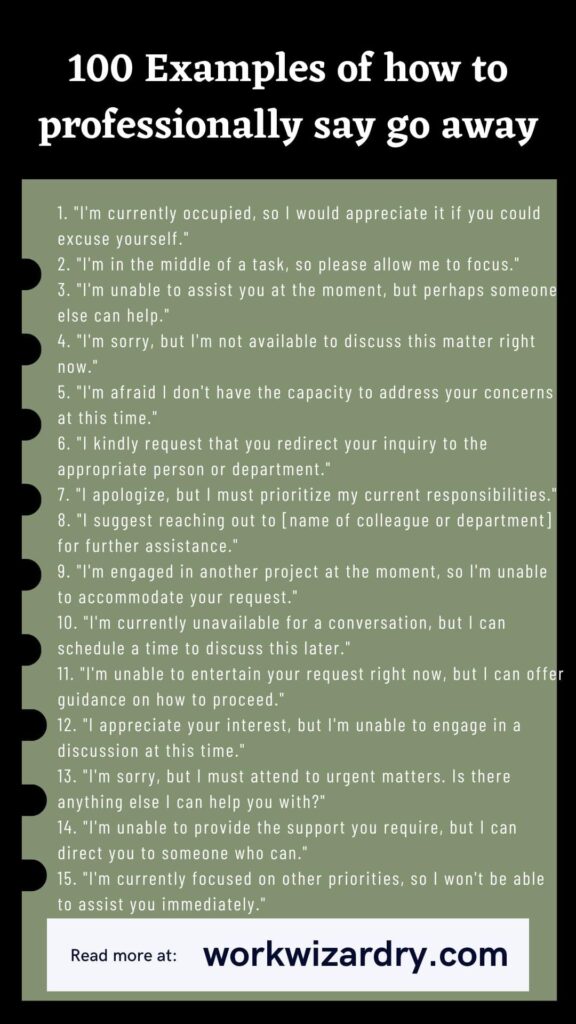
How to politely tell someone to leave?
If you are wondering how to politely tell someone to leave and How to tell someone off nicely here are few examples you can use:
1. “I appreciate your company, but I’m going to need some alone time now.”
2. “I’m sorry, but I have some personal matters to attend to, so I’ll need you to excuse yourself.”
3. “I’m sure you understand that I need some solitude right now.”
4. “I value our interactions, but I would prefer some time to myself. Thank you for understanding.”
5. “I think it’s best if we part ways for now. I’ll catch up with you later.”
6. “I’m feeling a bit overwhelmed, so I think it would be best if we continued this conversation another time.”
7. “I have some tasks that require my full attention, so I’ll have to ask you to leave for now.”
8. “I’m in need of some quiet time, so I kindly request that you find a different space for the moment.”
9. “I appreciate your presence, but I need to create a calm environment for myself right now.”
10. “I’m sorry if it seems abrupt, but I would appreciate it if you could give me some space.”
11. “I’m feeling a bit fatigued, so I would prefer if we could continue our interaction later.”
12. “I’m seeking some solitude at the moment, so I kindly ask that you respect my need for privacy.”
13. “I’m sorry, but I’m not available to socialize right now. Let’s catch up another time.”
14. “I have some personal matters that require my attention, so I must request that you leave for now.”
15. “I’m in the middle of something important and could use some uninterrupted time. Please excuse yourself.”
16. “I’m going to step away for a moment, so I’d appreciate it if you could give me some space.”
17. “I’m feeling a little overwhelmed, and I think it would be best if I had some time alone.”
18. “I have some personal reflection to do, so I would appreciate it if you could give me some privacy.”
19. “I think it’s time for me to wind down and relax. It would be great if we could catch up another time.”
20. “I have some tasks to attend to that require my full concentration, so I’ll need you to leave for now. Thank you for understanding.”
Also read: How to professionally say Are you Stupid? (50+ Examples)
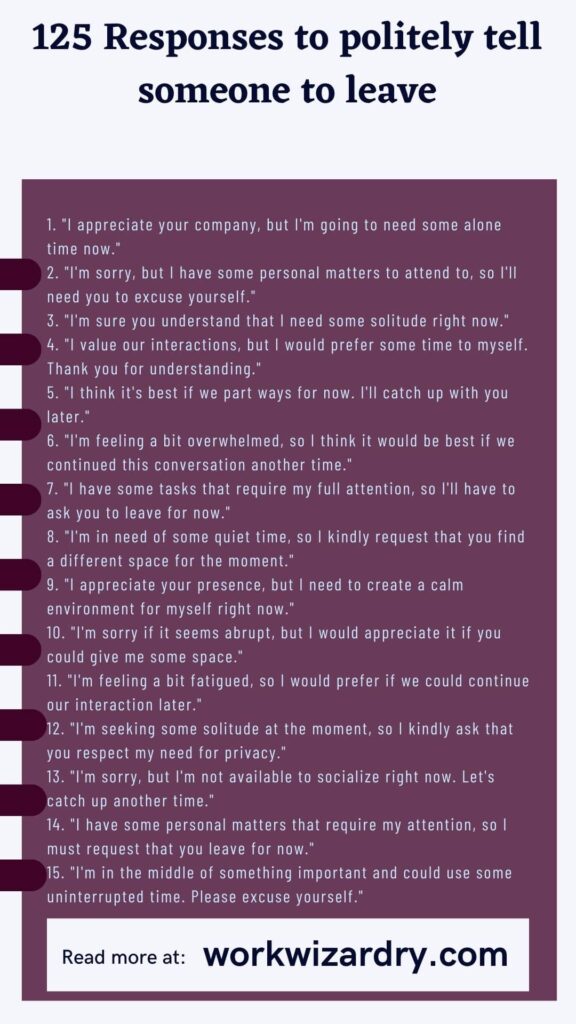
How to professionally tell someone off at work professionally?
These are some examples on how to tell someone to back off at work place:
1. “I appreciate your input, but I believe it would be best if we stick to the facts and avoid personal attacks.”
2. “I understand your perspective, but it’s important for us to maintain a respectful tone and focus on finding a solution.”
3. “I value open communication, but it’s essential that we address our concerns in a constructive and professional manner.”
4. “I would prefer if we approached this discussion with a focus on finding common ground and collaborating effectively.”
5. “I understand you may have strong opinions, but it’s important to express them respectfully and consider other viewpoints as well.”
6. “Let’s remember that we’re all working towards the same goals. I encourage us to maintain a positive and supportive environment.”
7. “I appreciate your passion, but it’s crucial that we address any disagreements in a professional and solution-oriented manner.”
8. “I understand tensions may arise, but let’s focus on maintaining professionalism and finding a compromise that benefits the team.”
9. “I believe we can have a productive conversation by listening to each other respectfully and refraining from any personal attacks.”
10. “It’s important for us to address any concerns or conflicts professionally, with a focus on maintaining a harmonious work environment.”
11. “I encourage open dialogue, but let’s ensure that our feedback is constructive and aimed at improving our work processes.”
12. “I understand you may be frustrated, but it’s important to express your concerns professionally and seek a mutually beneficial resolution.”
13. “Let’s approach this situation with professionalism and respect, finding a way to resolve our differences while fostering a positive work environment.”
14. “I appreciate your perspective, but let’s make sure our discussions remain focused on the work and maintain a respectful tone.”
15. “I believe in open communication, but it’s crucial that we express our opinions respectfully and consider the potential impact on the team.”
16. “I understand you may have concerns, but let’s address them in a constructive manner that contributes to our shared goals.”
17. “I value collaboration, so let’s find a way to work together effectively by maintaining professionalism and open-mindedness.”
18. “I appreciate your feedback, but let’s ensure our communication remains professional and focused on achieving the best outcomes for our team.”
19. “I encourage us to maintain a professional and respectful approach, even when we face challenges or differences of opinion.”
20. “Let’s strive for professionalism and constructive dialogue as we navigate any disagreements or conflicts, ensuring we prioritize a positive work environment for everyone involved.”
Also read: How to say I don’t agree professionally and say no politely? (100+ Examples)
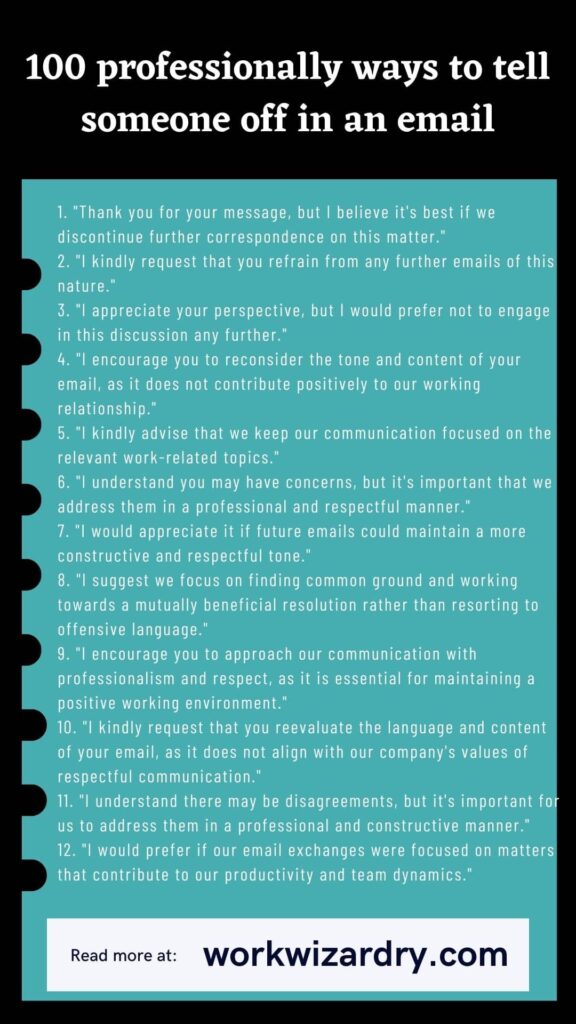
How to professionally tell someone off in an email?
I understand that you may be feeling frustrated or upset, but it’s important to maintain professionalism and respectful communication in all correspondence, including emails.
Instead of using offensive language, If you are wondering how to tell someone off in an email? here are some alternative ways to respond assertively and professionally:
1. “Thank you for your message, but I believe it’s best if we discontinue further correspondence on this matter.”
2. “I kindly request that you refrain from any further emails of this nature.”
3. “I appreciate your perspective, but I would prefer not to engage in this discussion any further.”
4. “I encourage you to reconsider the tone and content of your email, as it does not contribute positively to our working relationship.”
5. “I kindly advise that we keep our communication focused on the relevant work-related topics.”
6. “I understand you may have concerns, but it’s important that we address them in a professional and respectful manner.”
7. “I would appreciate it if future emails could maintain a more constructive and respectful tone.”
8. “I suggest we focus on finding common ground and working towards a mutually beneficial resolution rather than resorting to offensive language.”
9. “I encourage you to approach our communication with professionalism and respect, as it is essential for maintaining a positive working environment.”
10. “I kindly request that you reevaluate the language and content of your email, as it does not align with our company’s values of respectful communication.”
11. “I understand there may be disagreements, but it’s important for us to address them in a professional and constructive manner.”
12. “I would prefer if our email exchanges were focused on matters that contribute to our productivity and team dynamics.”
13. “I appreciate your perspective, but let’s maintain a professional tone and approach in our email communication.”
14. “I kindly ask that you reconsider the language and tone of your email to ensure a respectful and productive exchange.”
15. “I encourage us to find a way to address our concerns or disagreements professionally and collaboratively, without resorting to offensive language or personal attacks.”
Also read: How to professionally say I’m too busy for this? (50+ Example responses)
Conclusion:
In conclusion, it is crucial to approach situations professionally, maintain respect, and foster collaboration.
Instead of using offensive language, focus on clarifying roles, appreciating expertise, asking questions, and offering constructive feedback.
By adopting this approach, you can address issues effectively while preserving positive working relationships and a harmonious work environment.




